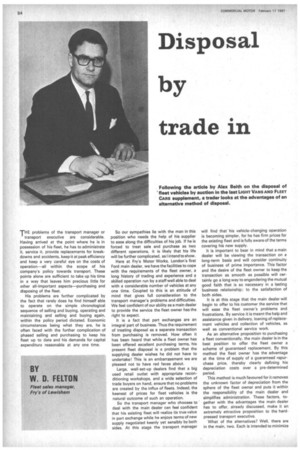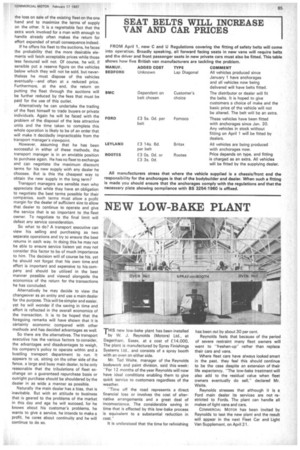Disposal by trade in
Page 86

Page 87

If you've noticed an error in this article please click here to report it so we can fix it.
THE problems of the transport manager or
transport executive are considerable. Having arrived at the point where he is in possession of his fleet, he has to administrate it, service it. provide replacements for breakdowns and accidents, keep it at peak efficiency and keep a very careful eye on the costs of operation all within the scope of his company's policy towards transport. These points alone are sufficient to take up his time in a way that leaves him precious little for other all-important aspects—purchasing and disposing of the fleet.
His problems are further complicated by the fact that rarely does he find himself able to operate on the simple chronological sequence of selling and buying, operating and maintaining and selling and buying again, within the policy period dictated. Economic circumstances being what they are, he is often faced with the further complication of phased selling and purchasing to keep his fleet up to date and his demands for capital expenditure reasonable at any one time. So our sympathies lie with the man in this position who needs the help of his supplier to ease along the difficulties of his job. If he is forced to treat sale and purchase as two different operations, it is likely that his life will be further complicated, as I intend to show.
Here at Fry's Motor Works. London's first Ford main dealer, we have the facilities to cope with the requirements of the fleet owner, a long history of trading and experience and a skilled operation run by a staff well able to deal with a considerable number of vehicles at any one time. Coupled to this is an attitude of mind that gives full consideration to the transport manager's problems and difficulties. We feel confident of our ability as a main dealer to provide the service the fleet owner has the right to expect.
It is a fact that part exchanges are an integral part of business. Thus the requirement of treating disposal as a separate transaction from purchasing is removed. How often it has been heard that while a fleet owner has been offered excellent purchasing terms, his present fleet disposal is a problem that the supplying dealer wishes he did not have to undertake! This is an embarrassment we are pleased not to have red faces about.
Large, well-set-up dealers find that a big used retail outlet with appropriate reconditioning workshops, and a wide selection of trade buyers on hand, ensure that no problems are created by the influx of fleets. Indeed, the keenest of prices for fleet vehicles is the natural outcome of such an operation.
So the transport manager who chooses to deal with the main dealer can feel confident that his existing fleet will realize its true value in part exchange while he enjoys terms of new supply negotiated keenly yet sensibly by both sides. At this stage the transport manager will find that his vehicle-changing operation is becoming simpler, for he has firm prices for the existing fleet and is fully aware of the terms covering his new supply.
It is important to bear in mind that a main dealer will be viewing the transaction on a long-term basis and will consider continuity of business of prime importance. This factor and the desire of the fleet owner to keep the transaction as smooth as possible will certainly go a long way to engendering the mutual good faith that is so necessary in a lasting business relationship; to the satisfaction of both sides.
It is at this stage that the main dealer will begin to offer to his customer the service that will ease the fleet owner's problems and frustrations. By service it is meant the help and assistance given in delivery, loaning of replacement vehicles and collection of vehicles, as well as conventional service work.
As an alternative proposition to purchasing a fleet conventionally, the main dealer is in the best position to offer the fleet owner a scheme of guaranteed replacement. By this method the fleet owner has the advantage at the time of supply of a guaranteed repurchase price, thereby clearly defining his depreciation costs over a pre-determined period.
This method is much favoured for it removes the unknown factor of depreciation from the sphere of the fleet owner and puts it within the responsibility of the main dealer and simplifies administration. These factors, together with the advantages the main dealer has to offer, already discussed, make it an extremely attractive proposition to the hardpressed transport executive.
What of the alternatives? Well, there are in the main, two. Each is intended to minimize the loss on sale of the existing fleet on the one hand and to maximize the terms of supply on the other. It is a regrettable fact that the extra work involved for a man with enough to handle already often makes the return for effort expended of small consequence indeed.
If he offers his fleet to the auctions, he faces the probability that the more desirable elements will fetch acceptable prices while those less favoured will not. Of course, he will, if sensible put a reserve figure on the vehicles below which they will not be sold, but nevertheless he must dispose of the vehicles eventually—and often at a reduced price. Furthermore, at the end, the return on putting the fleet through the auctions will be further reduced by the fees that must be paid for the use of this outlet.
Alternatively he can undertake the trading of the fleet himself to trade buyers or private individuals. Again he will be faced with the problem of the disposal of the less attractive units and the time taken to complete this whole operation is likely to be of an order that will make it decidedly impracticable from the transport manager's viewpoint.
However, assuming that he has been successful in either of these methods, the transport manager is in an enviable position to purchase again. He has no fleet to exchange and can negotiate the maximum discount terms for his new supply with any dealer he chooses. But is this the cheapest way to obtain the new supply in the long term?
Transport managers are sensible men who appreciate that while they have an obligation to negotiate the best terms possible for their companies, such terms must allow a profit margin for the dealer of sufficient size to allow that dealer to continue to operate and give the service that is so important to the fleet owner. To negotiate to the final limit will defeat any service consideration.
So what to do? A transport executive can view his selling and purchasing as two separate operations and try to ensure the best returns in each way. In doing this he may not be able to ensure service liaison yet may not consider this factor to be of much importance to him. The decision will of course be his, yet he should not forget that his own time and effort is important and expensive to his company and should be utilized in the best manner possible and viewed alongside the economics of the return for the transactions he has concluded.
Alternatively he may decide to view the changeover as an entity and use a main dealer for the purpose. This will be simpler and easier, yet he will wonder if the saving in time and effort is reflected in the overall economics of the transaction. It is to be hoped that the foregoing remarks will have shown that it is certainly economic compared with other methods and has decided advantages as well.
So there are the alternatives. The transport executive has the various factors to consider, the advantages and disadvantages to weigh, his company's policy to operate within and a bustling transport department to run. It appears to us, sitting on the other side of the fence, a large and busy main dealer, to be only reasonable that the tribulations of fleet exchange on a guaranteed repurchase basis or outright purchase should be shouldered by the dealer in as wide a manner as possible.
Naturally the main dealer has a bias, that is inevitable. But with an attitude to business that is geared to the problems of the market in this day and age he will succeed, for he knows about his customer's problems, he wants to give a service, he intends to make a profit, he cares about continuity and he will continue to do so.
THIS new low-bake plant has been installed
by W. J. Reynolds (Motors) Ltd., at Dagenham. Essex, at a cost of £14,000. The plant is manufactured by Spray Finishings Systems Ltd., and consists of a spray booth with an oven on either side.
Mr. Ted Waite, manager of the Reynolds bodywork and paint division, said this week: "For 12 months of the year Reynolds will now have ideal conditions enabling them to give quick service to customers regardless of the weather.
"Time off the road represents a direct financial loss or involves the cost of alternative arrangements and a great deal of inconvenience. The considerable saving in time that is effected by this low-bake process is equivalent to a substantial reduction in cost."
It is understood that the time for refinishing has been cut by about 30 per cent.
Reynolds feels that because of the period of severe restraint many fleet owners will want to "freshen-up" rather than replace their cars and vans.
Where fleet cars have always looked smart in the past, they feel this should continue to be the case despite an extension of their life expectancy. "The low-bake treatment will also add to the residual value when fleet owners eventually do sell," declared Mr. Waite.
Reynolds stresses that although it is a Ford main dealer its services are not restricted to Fords. The plant can handle all makes of light vans and cars.
COMMERCIAL MOTOR has been invited by Reynolds to test the new plant and the result will appear in the next Fleet Car and Light Van Supplement, on April 21.




































































































































